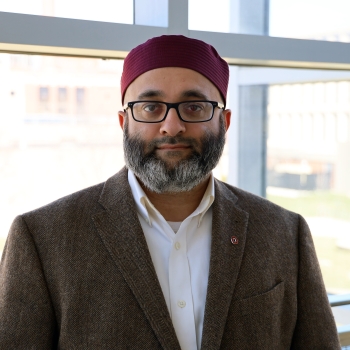Ayaz Hyder, PhD
Associate Professor
Core Faculty, Translational Data Analytics Institute
Environmental Health Sciences

“Public health is my life. I get up every morning to carry out the mission of public health in service of all Ohioans. I am passionate about finding solutions to complex public health issues, such as reproductive health, opioid addiction and food insecurity. Currently, public health systems and workforce are in decline due to lack of innovation and systems thinking. We must think anew about how we carry out the mission of public health. I envision a future for public health that is proactive, data-driven, apolitical and grounded in community needs. My contribution towards this vision is to build innovative models and data analytics tools for public health practice in Ohio and beyond.”
Biography
Dr. Hyder connects models to action for public health impact. He helps communities develop models that reflect their values by placing communities at the center of the modeling enterprise. The focal public health issues he addresses are birth and infant outcomes, addiction and food insecurity. Common to these outcomes is the role of social determinants of health, the need for multiple stakeholder engagement and breaking down discipline and data silos to come up with holistic and sustainable interventions.
A novel theme of Dr. Hyder's research is developing strategies for community-centered modeling where models are co-created, personalized and relevant to community needs, and generalizable to other communities.
Education
- Research Associate
- Health Services Research, University of Toronto, 2013-2015
- Postdoctoral training
- Environmental Epidemiology, Yale University, 2011-2013
- PhD
- Biology, McGill University, 2012
- BSc
- Biology, McMaster University, 2005
Research interests
Systems Science, Agent-Based Modeling, Birth Outcomes/Infant Mortality, Environmental Epidemiology, Air Pollution, Citizen Science, Opioid epidemic, Food insecurity, Smart Cities, Health Economics
2nd Place in Poster Session #2 at Society for Epidemiological Research Conference 2019.
Select publications
- Hyder A, Trinh A, Padmanabhan P, Marschhausen J, Wu A, Evans A, Iyer R, Jones A. COVID-19 Surveillance for Local Decision Making: An Academic, School District, and Public Health Collaboration. Public Health Reports. 2021 May 12:00333549211018203.
Hyder A, Lee J, Dundon A, Southerland LT, All D, Hammond G, Miller HJ. Opioid Treatment Deserts: Concept development and application in a US Midwestern urban county. Plos one. 2021 May 12;16(5):e0250324. - Hyder, A. (2020). Teaching systems science to public health professionals. Public Health, 181, 119-121.
- Hyder, A., & May, A. A. (2020). Translational data analytics in exposure science and environmental health: a citizen science approach with high school students. Environmental Health, 19(1), 1-12.
- Hyder, A., & Barnett, K. S. (2020). Low Birth Weight and Preterm Birth Among Arab-American Women in Ohio. Maternal and Child Health Journal, 1-10.
- Hollander, A. D., Hoy, C., Huber, P. R., Hyder, A., Lange, M. C., Latham, A., ... & Tomich, T. P. (2020). Toward Smart Foodsheds: Using Stakeholder Engagement to Improve Informatics Frameworks for Regional Food Systems. Annals of the American Association of Geographers, 110(2), 535-546.
- Koh, K., Kaiser, M. L., Sweeney, G., Samadi, K., & Hyder, A. (2020). Explaining Racial Inequality in Food Security in Columbus, Ohio: A Blinder–Oaxaca Decomposition Analysis. International journal of environmental research and public health, 17(15), 5488.
- Hyder, A. (2018). Public Funding for Genomics and the Return on Investment: A Public Health Perspective. Perspectives in Biology and Medicine, 61(4), 572-583.
- Reno, R., & Hyder, A. (2018). The evidence base for social determinants of health as risk factors for infant mortality: A systematic scoping review. Journal of health care for the poor and underserved, 29(4), 1188-1208.
- Hosseinichimeh, N., MacDonald, R., Hyder, A., Ebrahimvandi, A., Porter, L., Reno, R., ... & Andersen, D. F. (2017). Group model building techniques for rapid elicitation of parameter values, effect sizes, and data sources. System Dynamics Review, 33(1), 71-84.
- Milwid, R., Steriu, A., Arino, J., Heffernan, J., Hyder, A., Schanzer, D., ... & Moghadas, S. M. (2016). Toward standardizing a lexicon of infectious disease modeling terms. Frontiers in public health, 4, 213.
Courses
In the news
COVID cases in Ohio kids surpass previous record with more than 7,000 in a single week
The Columbus Dispatch